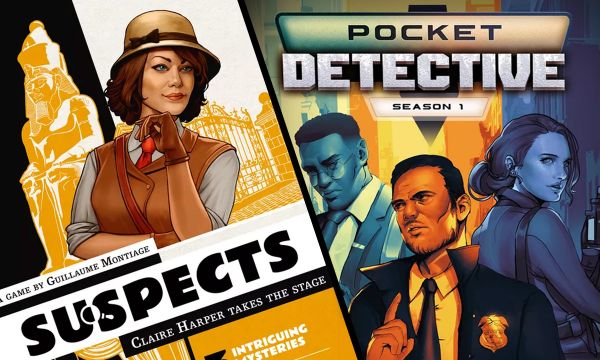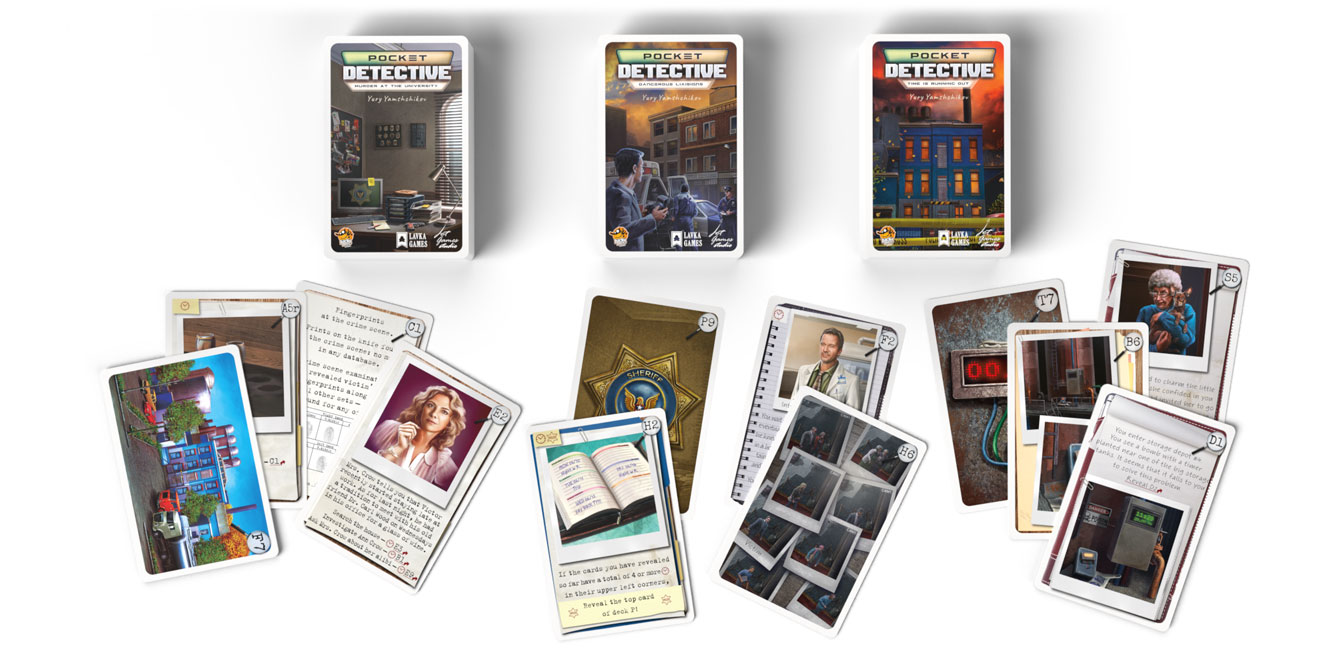Set Collections: Become Gumshoes to Crack Cases in Suspects and Pocket Detective

Welcome to the latest in a series examining board games from a different point of view. Rather than breaking down one game on its own, this Set Collections hopes to explore multiple games with some common traits (theming, mechanics, designers, etc.) worth exploring. The purpose is not to compare and provide an answer on which game is better, but rather to highlight why both are appealing games. This time we’ll discuss two games that put players at scenes of various crimes to solve: Suspects and Pocket Detective.
Under the Magnifying Glass
Both Pocket Detective and Suspects are no frills in their components: decks of cards. Pocket Detective says it all within its name: each of the three decks presents its own case in the size of a standard set of playing-sized cards. Suspects has oversized cards, but also presents each of its cases in three separate decks. Where Suspects differs is the inclusion of envelopes that contain additional information, be it the map, a family tree, or a playbill. With Pocket Detective, everything you need for each case will be contained in that case’s deck.
Something Seems Different
The first noticeable difference between Suspects and Pocket Detective is theming. Suspects places players in the role of Claire Harper, who comes with a striking resume and feels like a 1920s version of a young Jessica Fletcher in how the game’s narrative unfolds. Pocket Detective is contemporary, and its narrative is more cold, calculated, and to the point. It feels like a modern procedural.
How players interact with these cards are similar, but uncovering new cards is a bit different between the games. In Pocket Detective, the decks are separated alphanumerically, so there will be an A pile, a B pile, etc. Once players read the introduction cards at the top of the deck, they will separate these cards and begin by finding the alphanumerical card from each pile. For example, if the introduction card instructs players to speak to someone represented by C5, visit a place at D3, or look up the profile of a suspect by choosing B4, players will make their choice and begin their adventure. Of course, they can always come back to the introduction card if they hit a dead end in one of their branches, or feel they are being led off course.

Sample cards from Pocket Detective (image provided by the publisher)
Suspects has similar leads in their cards (which are just numbered and remain in one stack), but the other artifacts such as the playbill or a map will allow players an easier starting point. Being able to see the whole of a map or a family tree with the list of suspects can make the entry point to the case a little less overwhelming despite the added paraphernalia.
Working through a case is very similar in both games. You’ll talk to suspects and potential witnesses or interested parties, you’ll uncover and collect evidence or interesting tidbits of information, and along the way you will form opinions based on what’s been collected. However, how you are scored differs. Suspects provides a list of what players should be collecting in terms of information, and decks even contain specific pieces of evidence that can be used directly in implicating a chosen suspect as the perpetrator. Pocket Detective can be a bit more inferential, asking players to dive into the information and perhaps make educated guesses to arrive at the conclusion.
And these conclusions are where the games really separate themselves. In Pocket Detective, players will uncover time with most of the cards they gather, and sometimes they will gain tempers if they choose to push through a scenario or confront someone. With Suspects, it’s a matter of trying to solve the case using as few cards as possible, but also being able to accurately answer each question posed in its introduction.
We’re More Alike, My Dear Watson
The trip to each game’s finale may not be quite the same, but the scoring tallies are very similar. Pocket Detective will have you choose a card from the corresponding pile, and if you are correct you are given a point total minus the number of time and temper symbols players uncovered. Suspects also factors in the number of cards, but also has players grade themselves on the accuracy of answering the questions they were given at the beginning of the scenario.
These will correspond to outcomes that will be read, and the higher one’s score, the more successful the case and its closure will be. There is also total failure, either from guessing incorrectly or using too many cards.
.png)
Components from Suspects (image provided by the publisher)
Final Thoughts
Though both games place players in the role of gumshoes, the manner in which the respective decks are leveraged creates two wholly unique experiences. The tenor of each game is vastly different, and that may be where players find themselves gravitating toward one over the other. Suspects is a bit more of an homage to Agatha Christie and post-Victorian England; Pocket Detective feels like Law and Order or Dragnet. Suspects is a bit more free-wheeling both in how players interact with its narratives, but also in how they answer the questions and the accuracy of grading themselves. Pocket Detective is dry, to the point, and makes no bones about making sure you nail the perp before daring to pick a card and finishing the story.
That said, both are great distillations of the bigger games of the genre that swept the hobby nearly a decade ago. They are easy to play, travel well, and provide a great entry point into cooperative deduction games without rules overhead. Players can unwrap the box, take out a deck, and begin playing immediately without needing to watch a video or read the rules beforehand because the rules are on the cards. Ultimately, that’s what makes these games so successful and complimentary. This new, emerging genre of deduction games meshing with forking path narratives in an easy-to-play format should be gaining more traction — and here’s hoping they do! Suspects already has newer volumes in France just waiting to be translated for other audiences, and Pocket Detective bills its initial offering as Season One. Here’s hoping for both to continue to come to North American audiences craving a bit of investigative fun.




